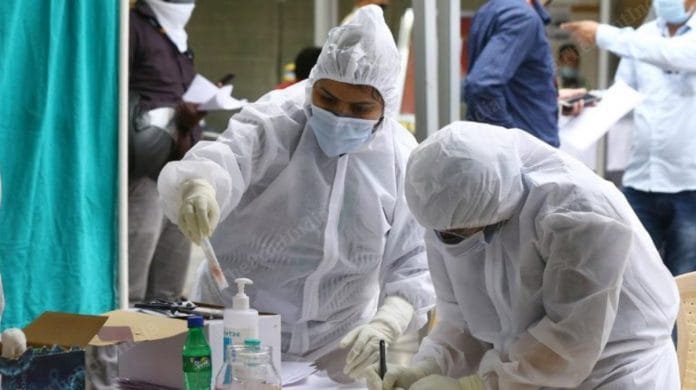Thank you dear subscribers, we are overwhelmed with your response.
Your Turn is a unique section from ThePrint featuring points of view from its subscribers. If you are a subscriber, have a point of view, please send it to us. If not, do subscribe here: https://englishdev.theprint.in/subscribe/
We saw terrible tragedy
We all – every single one of us has lost someone or know someone who lost a dear one because of the pandemic. We all forwarded urgent messages from or to people looking for hospital beds, oxygen cylinders, medications. We saw funeral pyres spilling out from overburdened crematoriums onto footpaths and roads. We recall horrific images of bodies washed up on the shores of the Ganga.
The wrath of an infection cutting a swathe through the population is not something we had ever encountered before. Healthcare providers helpless in the face of the onslaught but fighting on determined, were the heroes of those times. I recall a military doctor musing despairingly during the merciless second wave, “ma’am, I am turning people away every day because I have no beds. I am wondering whether I should set up beds here in the parking lot!”
To say the situation was grim is an understatement – however I encountered so many blessings that I am eternally grateful for.
I learned about my vast privilege
When a complete lockdown was callously imposed with barely any notice, numerous people lost their livelihood, while I was able to continue working from the comfort of my home. While numerous children suddenly lost access to education, my kids could ‘attend’ classes from the comfort of their beds.
While lakhs walked hundreds of kilometres to reach their homes because they simply had no option, all the commotion caused barely a ripple on the surface of my comfortable life in my secure home. While I had the means and the convenience to have most things delivered to my doorstep, there were hardworking people being subjected to a new kind of untouchability. While self-righteous RWA Uncles were busy devising ever-more draconian rules for delivery and service people, my privilege meant that it all me impacted me not at all.
As we reflect on the pandemic, it’s crucial to consider the broader implications of our experiences, including the government’s response to the crisis. The announcement of measures like the ‘Janata Curfew’ was a significant step in urging citizens to stay safe and curb the spread of the virus. This initiative highlighted the importance of collective responsibility during such unprecedented times, as we all navigated the challenges posed by COVID-19. The Janata Curfew served as a reminder of our shared duty to protect one another.
The blessings were many
I am an atheist but if I were a believer, I would say I am blessed. My daughters going into online study mode had unexpectedly positive outcomes for me as I worked from home. We would work in our respective rooms and wander into each other’s rooms for a break or a chat. We would laugh together at the dog’s antics and make videos. We would come across an interesting recipe on social media and decide to do some baking — because, you know everyone was. My daughter would flop down on my bed and demand hugs when bored.
For me as a mother, this time was delightful and infinitely precious. For me COVID times were a bonus. The fact that I was infected twice and barely experienced mild fever and some fatigue made me overwhelmingly grateful.
The terrible toll COVID took
But, but, but. The impact on my children was very different indeed. My two teens should have been in school spending time with their friends, bonding, learning vital social skills wandering, playing outdoors, scraping their knees and having crushes on unsuitable people.
Instead they were stuck indoors day after day, stuck in an artificial virtual learning environment. They had no access to their friends and networks except through the strangely distorted means of social media. They couldn’t learn normal skills that they otherwise would have; which would help them become autonomous individuals.
We have seen how isolation imposed by the COVID pandemic resulted in a veritable epidemic of mental health issues in the population; particularly children and adolescents. Not only has there been a spurt in kids suffering from depression and anxiety, kids no longer enjoyed doing things they usually did.
A study also shows how teen brains aged prematurely during the COVID 19 pandemic; that the brains of teen study participants had aged three years in the span of about ten months. Researchers noted that the pandemic disruption impacted young minds in much the same way as traumatic events or adverse conditions such as violence, family dysfunction or neglect would. Kids were found to be internalising their problems more. The area of the brain connected to problem-solving and self-control was seen to be less developed. This, say researchers, put the kids at greater risk of not just mental health issues and addiction, but also increased risk of cancer, heart disease and diabetes.
So while I may well count my own blessings that the COVID 19 pandemic left me and mine relatively unscathed, I wonder about the long term consequences that may not yet be evident. It is an uneasy thought – one that pops up on my mental horizon every now and again.
These pieces are being published as they have been received – they have not been edited/fact-checked by ThePrint.


